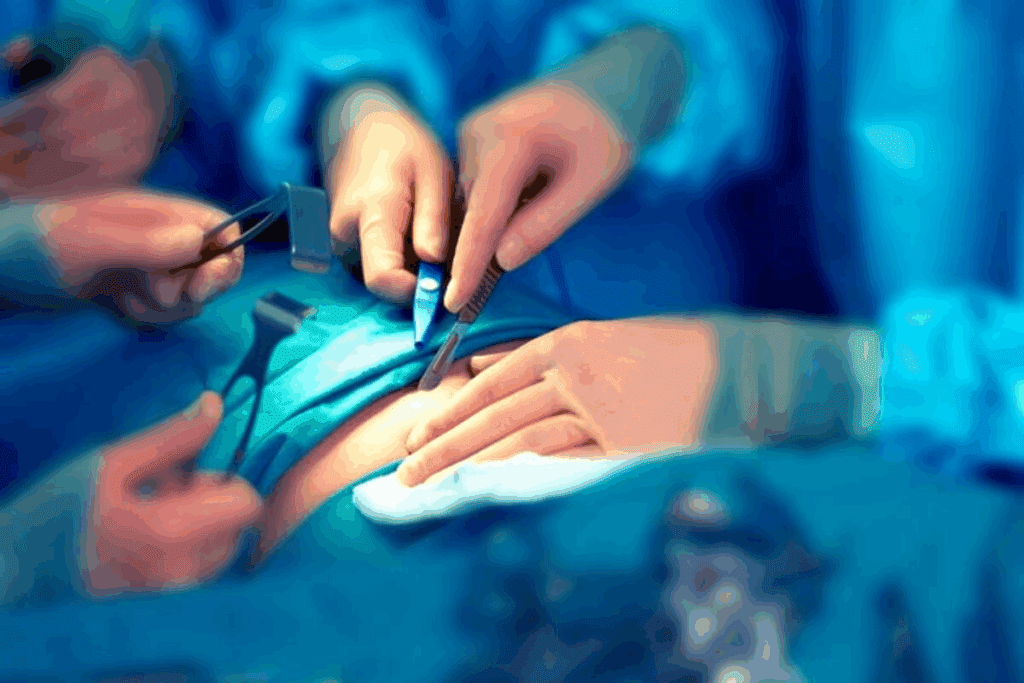
What Is Cystectomy: Definition and Overview
Cystectomy is a surgery that removes the bladder, either partially or fully. It’s done for patients with bladder cancer or severe bladder issues that other treatments can’t fix. Before deciding on a cystectomy, doctors consider other treatment options carefully.
The surgery can be partial or radical. Partial cystectomy removes just the affected bladder part. Radical cystectomy takes out the whole bladder. The choice depends on the disease’s extent and location.
Cystectomy is a big surgery that needs thorough planning. Patients should know the risks and benefits. They should talk about any worries with their doctor.
In summary, cystectomy is a complex surgery for severe bladder issues. It’s important for patients and doctors to understand the procedure and its implications.
Cystectomy Is the Surgical Procedure for Treating Bladder Cancer
Cystectomy is a surgery that removes the bladder. It’s often used for patients with invasive bladder cancer. The aim is to get rid of cancer cells and stop them from spreading.
Patients going through cystectomy can have different results. The success of the surgery depends on the cancer’s stage and the patient’s health.
Choosing to have cystectomy is a big decision. It’s made after looking at the patient’s condition and how far the disease has spread.
Types of Cystectomy Procedures
Cystectomy is a major surgery to remove the bladder. It’s used to treat bladder cancer or severe bladder issues. There are two main types: radical cystectomy and partial cystectomy.
Radical Cystectomy
Radical cystectomy is a big surgery. It removes the bladder, nearby tissues, and sometimes other organs. Men might lose the prostate and seminal vesicles. Women might lose the uterus, ovaries, and part of the vagina. It’s often chosen for invasive bladder cancer.
Partial Cystectomy
Partial cystectomy is a smaller surgery. It only takes out the bad part of the bladder. This is for cancers that are only in one spot. It tries to keep as much bladder function as it can.
Choosing the Right Procedure
Choosing between radical and partial cystectomy depends on many things. These include the cancer’s stage and location, the patient’s health, and their wishes. Knowing what each surgery means is key to making a good choice.
Preparing for Cystectomy Surgery
Getting ready for cystectomy surgery involves several steps. You’ll need to go through pre-surgical checks, make lifestyle changes, and learn about the surgery itself.
Pre-Surgical Evaluations
Before the surgery, you’ll have a series of tests. These include looking at your medical history, a physical check-up, and lab tests. These steps help doctors understand your health and spot any possible risks.
Lifestyle Adjustments
You might need to change your lifestyle to lower risks. This could mean quitting smoking, losing weight, or changing your diet. These adjustments can help you have a better outcome and avoid complications.
Knowing what to expect and preparing well can lead to a successful surgery. It helps in reducing risks and improving your health.
The Cystectomy Procedure: Surgical Techniques
Cystectomy is a surgery to remove the bladder, often for bladder cancer. The choice of surgery depends on the cancer’s stage and the patient’s health.
Open Surgery
Open surgery uses a big incision to reach the bladder. It’s chosen for complex cases.
Laparoscopic Surgery
Laparoscopic surgery makes small cuts. It’s less invasive, leading to quicker recovery and less scarring.
Urinary Diversion Methods Following Cystectomy
Urinary diversion is a surgery that makes a new way for urine to leave the body after a cystectomy. There are a few types, like ileal conduit and orthotopic neobladder reconstruction.
Ideal Conduit Urinary Diversion
Ideal conduit urinary diversion uses a piece of intestine to make a conduit. It’s a simple procedure with a low chance of problems.
Orthotopic Neobladder Reconstruction
Orthotopic neobladder reconstruction is more complex. It makes a new bladder from intestine tissue. This method allows for more natural urination, improving the patient’s life quality.
Risks, Complications and Recovery Process
Choosing to have a cystectomy is a big decision. It’s important to know the risks and complications that can happen. This surgery is life-saving for many, but it’s good to be aware of possible issues.
Potential Risks and Complications
Some risks include infection, bleeding, and problems with urinary diversion. Infection can happen at the surgery site or in the urinary tract. Watch for signs like fever, chills, or trouble urinating.
Bleeding can be mild or severe. Know the signs of too much bleeding. If you see unusual symptoms, get medical help right away.
Managing Complications
To lower the risk of problems, follow your doctor’s instructions closely. This means taking your meds, going to follow-up visits, and watching for any signs of trouble.
Knowing about the risks and complications helps prepare you for the surgery and recovery. It’s a step towards a smoother process.
Long-Term Outcomes and Quality of Life
It’s important for patients to understand the long-term effects of cystectomy. The five-year survival rate for bladder cancer patients depends on the disease’s stage.
Early-stage bladder cancer patients often have better survival rates. Some studies show a 70-80% five-year survival rate for them. But, those with more advanced disease may have a tougher time.
Regular follow-up care is key to keeping an eye on the patient’s health. Working closely with their healthcare team helps patients improve their quality of life. This way, they can get the most out of their treatment.
Conclusion: Living Life After Cystectomy
Having a cystectomy, or bladder removal surgery, is a big deal. People often wonder if they can go back to their usual lives after it. The answer is yes, with a few changes, you can live a happy life after cystectomy.
Adjusting to life after cystectomy means getting used to a new way of dealing with urine. This could be through an ileal conduit or an orthotopic neobladder. It might take some time, but many find they can get back to their daily activities.
After bladder removal, you’ll need to see doctors regularly to check for any issues. Joining support groups can also help. There, you can talk to others who have gone through the same thing.
Cystectomy changes your life, but it doesn’t stop you. With the right care and support, you can live well. Knowing what to expect after bladder removal surgery helps prepare you for what’s ahead.
FAQ
What is a cystectomy?
A cystectomy is a surgery to remove part or all of the bladder. It’s often done for bladder cancer or other bladder issues.
Why is a cystectomy necessary?
It’s needed to treat bladder cancer or remove damaged bladder tissue. It also helps with symptoms of certain urological problems.
What are the different types of cystectomy procedures?
There are two main types. One is total cystectomy, where the whole bladder is removed. The other is partial cystectomy, where just a part of the bladder is taken out.
What is the difference between a radical cystectomy and a simple cystectomy?
Radical cystectomy removes the bladder, surrounding tissues, and sometimes nearby organs. Simple cystectomy only removes the bladder.
How long does it take to recover from a cystectomy?
Recovery time varies. It depends on the surgery type, your health, and individual factors. It can take weeks to months to fully recover.
What are the possible complications of a cystectomy?
Complications can include infection, bleeding, urinary incontinence, and bowel obstruction.
Can I lead a normal life after a cystectomy?
Yes, many people can live active and fulfilling lives after a cystectomy. Some adjustments might be needed, though.
How will a cystectomy affect my urinary function?
The surgery type can change how you urinate. Some might experience changes in urination or incontinence.
Will I need to make lifestyle changes after a cystectomy?
Yes, you might need to adjust your diet or exercise routine. These changes help manage your condition and prevent complications.
Can I have children after a cystectomy?
In some cases, a cystectomy might affect fertility. It’s important to talk about fertility options with your doctor before surgery.
References
Government Health Resource, Removing Bladder- https://www.cancerresearchuk.org/about-cancer/bladder-cancer/treatment/invasive/surgery/removing-bladder

































